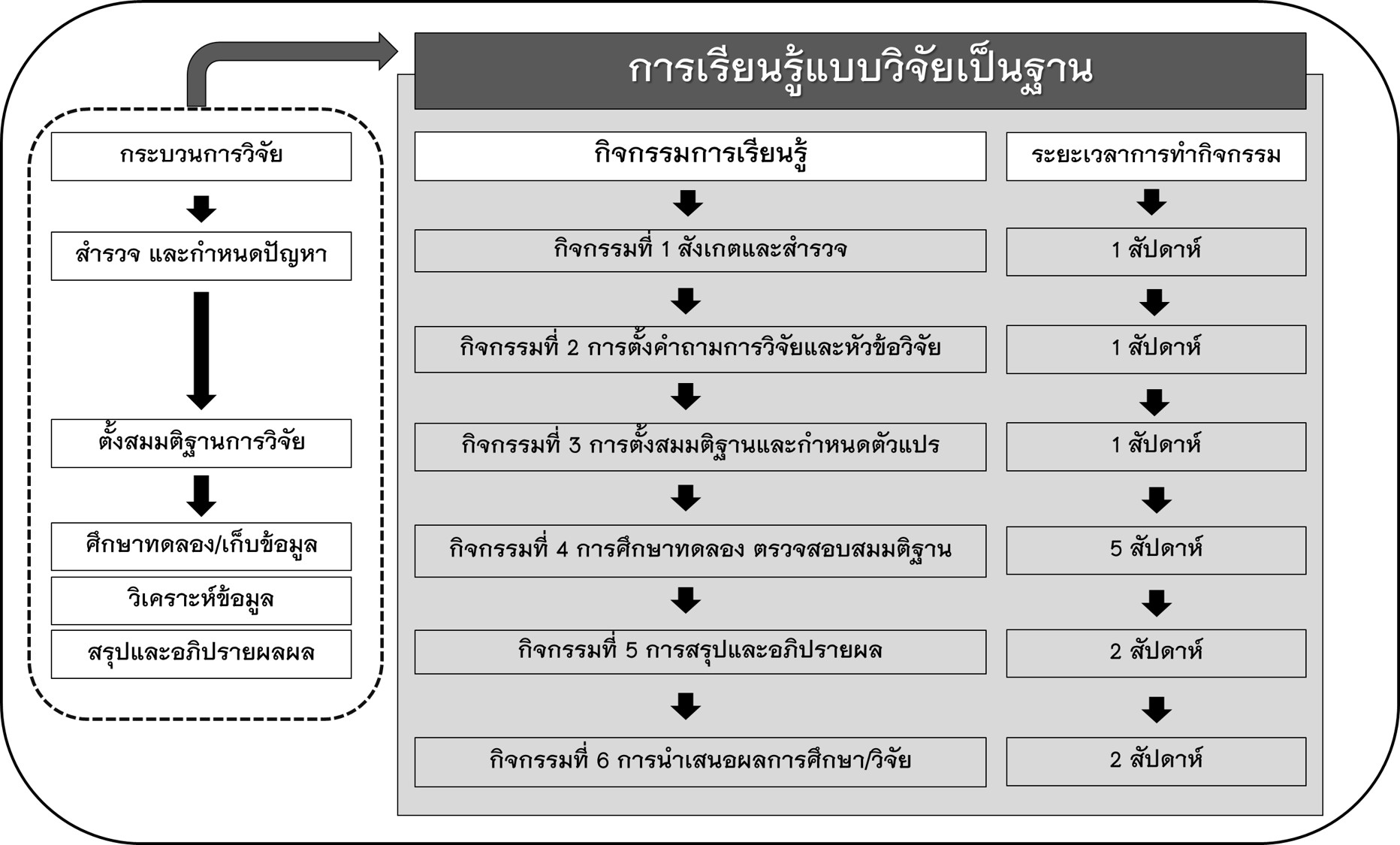The The study of learning behavior pattern using science process skills through research-based learning activity of science student teachers: formulating hypotheses and experimental skills
formulating hypotheses and experimental skills
Keywords:
Learning behavior pattern, Formulating hypothesis skill, Experimental skill, Research-based learning, Science student teacherAbstract
This paper report the results of studying the learning behavior pattern involving with science process skills, formulating hypothesis skill and experimental skill, of science student teachers through research-based learning (RBL) activity. This study used qualitative research methodology and inductive analysis. The subject is 44 of the 3rd year science student teacher, selected by purposive sampling. Research-based learning approach was allowed to design learning activity and then applied to use for electric and energy course. That activity composed of 6 minor activities. Research data were collected from learning behavior questions involving with formulating hypothesis skill and experimental skill (IOC = 1.00), before and after learning activities. The result indicating that students reflected their learning behavior pattern related with formulating hypothesis skill as 4 patterns. Among these, there is 1 pattern which exhibited self-inquiry learning, calculated as 5.6% before RBL activities and increasing in 76.5% after RBL activities. For reflecting of learning behavior in experimental skills of the students, we found that before RBL activities, there also are 4 different learning pattern. And there is still 1 pattern that reflects learning by using experiments to discover a knowledge by themselves, calculated as 17.4%. The interesting finding is a learning behavior pattern that reflect student learning by using experiments to search for knowledge by themselves, after RBL activity, was found as a very high level of up to 100%. The showed results is completely different from the learning pattern in which students reflect their learning behavior before studying.
References
ชาตรี ฝ่ายคำตา. (2559). ความเข้าใจเกี่ยวกับธรรมชาติของวิทยาศาสตร์ของนักศึกษาครูวิทยาศาสตร์ ในโครงการส่งเสริมการผลิตครูที่มีความสามารถพิเศษทางวิทยาศาสตร์และคณิตศาสตร์ (สควค.). วารสารศึกษาศาสตร์ มหาวิทยาลัยสงขลานครินทร์ วิทยาเขตปัตตานี, 27(2), 21-37.
ทิศนา แขมมณี. (2548). การจัดการเรียนรู้โดยผู้เรียนใช้การวิจัยเป็นส่วนหนึ่งของกระบวนการเรียนรู้. กรุงเทพมหานครฯ: สำนักวิจัยและพัฒนาการศึกษา สำนักเลขาธิการสภาการศึกษา.
บรรณรักษ์ คุ้มรักษา และเพชรลัดดา รักษากิจ. (2562). การพัฒนาทักษะกระบวนการทางวิทยาศาสตร์ด้วยการสอนโดยใช้วิจัยเป็นฐาน เรื่อง สมบัติของดิน สำหรับนักเรียนชั้นประถมศึกษาปีที่ 2 โรงเรียนเทศบาลแห่งหนึ่งในจังหวัดสุราษฎร์ธานี. วารสารหน่วยวิจัยวิทยาศาสตร์ เทคโนโลยี และสิ่งแวดล้อมเพื่อการเรียนรู้, 10(1), 14-29.
บรรณรักษ์ คุ้มรักษา และศศิพิมพ์ ชุมทอง. (2561). ผลของการสอนโดยใช้วิจัยเป็นฐานเรื่อง ชนิด สมบัติและประโยชน์ ของวัสดุ ในการพัฒนาทักษะกระบวนการทางวิทยาศาสตร์ของนักเรียนชั้นประถมศึกษาปีที่ 3 ของโรงเรียนแห่งหนึ่งในจังหวัดสุราษฎร์ธานี. ใน การประชุมวิชาการระดับชาติ คณะครุศาสตร์ มหาวิทยาลัย ราชภัฏลำปาง ครั้งที่ 4: ครุศาสตร์วิจัย 2561. คณะครุศาสตร์ มหาวิทยาลัยราชภัฏลำปาง, ลำปาง.
ลัดดา ภู่เกียรติ. (2552). การสอนแบบโครงงานและการสอนแบบใช้วิจัยเป็นฐาน: งานที่ครูประถมทำได้. กรุงเทพฯ: บริษัทสาฮะแอนด์ซันพริ้นติ้ง จำกัด.
ลือชา ลดาชาติ. (2558). การวิจัยเชิงคุณภาพสำหรับครูวิทยาศาสตร์. กรุงเทพฯ: โรงพิมพ์แห่งจุฬาลงกรณมหาวิทยาลัย.
ลือชา ลดาชาติ และลฎาภา ลดาชาติ. (2559). ความเข้าใจเกี่ยวกับธรรมชาติของการสืบเสาะทางวิทยาศาสตร์ของนิสิตครูวิชาเอกชีววิทยา. วารสารนวัตกรรมการเรียนรู้, 2(1), 24-44.
สถาบันส่งเสริมการสอนวิทยาศาสตร์และเทคโนโลยี. (2560). คู่มือการใช้หลักสูตรรายวิชาพื้นฐานวิทยาศาสตร์ กลุ่มสาระการเรียนรู้วิทยาศาสตร์ (ฉบับปรับปรุง พ.ศ. 2560) ตามหลักสูตรแกนกลางการศึกษาขั้นพื้นฐาน พุทธศักราช 2551 ระดับมัธยมศึกษาตอนต้น. กรุงเทพฯ: สถาบันส่งเสริมการสอนวิทยาศาสตร์และเทคโนโลยี.
สุธีระ ประเสริฐสรรพ์. (2555). โครงงานฐานวิจัย: กระบวนการเรียนรู้ใหม่ของการศึกษาไทย. กรุงเทพมหานคร: สำนักงานกองทุนสนับสนุนการวิจัย.
สุภาพร พรไตร และจิตติมา วัฒนราช. (2557). ผลการจัดการเรียนรู้แบบโครงงานฐานวิจัยต่อการเปลี่ยนแปลงคุณลักษณะพึงประสงค์ของนักเรียนชั้นมัธยมศึกษาปีที่ 5 ในโครงการเพาะพันธุ์ปัญญา. วารสารหน่วยวิจัยวิทยาศาสตร์ เทคโนโลยี และสิ่งแวดล้อมเพื่อการเรียนรู้, 5(2), 176-185.
เสาวภา วิชาดี. (2554). การศึกษาในกระบวนทัศน์ใหม่: การเรียนโดยใช้วิจัยเป็นฐาน. วารสารนักบริหาร, 31(3), 26-30.
American Association for the Advancement of Science (AAAS). (1967). Science – A process approach. Washington, DC: AAAS.
Coil, D., Wenderoth, M. P., Cunningham, M., & Dirks, C. (2010). Teaching the Process of Science: Faculty Perceptions and an Effective Methodology. CBE-life sciences education, 9(4), 524-535.
Lederman, N. G., Abd-El-Khalick, F., Bell, R. L., & Schwartz, R. S. (2002). Views of Nature of Science Questionnaire: Toward Valid and Meaningful Assessment of Learners' Conceptions of Nature of Science. Journal of Research in Science Teaching, 39(6), 497-521.
Moeed, A. (2013). Science Investigation That Best Supports Student Learning: Teachers' Understanding of Science Investigation. International Journal of Environmental and Science Education, 8(4), 537-559.
Schwartz, R. S., Lederman, N. G., & Crawford, B. A. (2004). Developing Views of Nature of Science in an Authentic Context: An Explicit Approach to Bridging the Gap between Nature of Science and Scientific Inquiry. Science Education, 88(4), 610-645.
Wilke, R. R., & Straits, W. J. (2005). Practical Advice for Teaching Inquiry-Based Science Process Skills in the Biological Science. The American Biology Teacher, 67(9), 534-540.

Downloads
Published
How to Cite
Issue
Section
License
ผู้นิพนธ์ต้องรับผิดชอบข้อความในบทนิพนธ์ของตน มหาวิทยาลัยพะเยาไม่จำเป็นต้องเห็นด้วยกับบทความที่ตีพิมพ์เสมอไป ผู้สนใจสามารถคัดลอก และนำไปใช้ได้ แต่จะต้องขออนุมัติเจ้าของ และได้รับการอนุมัติเป็นลายลักษณ์อักษรก่อน พร้อมกับมีการอ้างอิงและกล่าวคำขอบคุณให้ถูกต้องด้วย
The authors are themselves responsible for their contents. Signed articles may not always reflect the opinion of University of Phayao. The articles can be reproduced and reprinted, provided that permission is given by the authors and acknowledgement must be given.







